Are you enchanted by the elegant and unique Pharaoh Hound and dreaming of welcoming a puppy into your home? Perhaps you’ve even searched for “Black Pharaoh Hound Puppies For Sale,” curious about this rare and majestic breed. As someone who lives with one of these incredible dogs, I can tell you that while life with a Pharaoh Hound is truly extraordinary, there are some crucial facts to understand before you begin your search – especially regarding their color and where to find a healthy, purebred pup.
Many online sources claim to offer insights into the Pharaoh Hound, but few provide the perspective of an actual owner. Before our beloved Freya arrived, even we didn’t realize the depth of their unique personality and needs. This guide aims to bridge that gap, offering honest, owner-driven advice to help you navigate the journey of finding and raising your Pharaoh Hound puppy, debunking common myths along the way. Get ready to discover the real facts about this ancient, intelligent, and utterly charming breed!
Understanding the Pharaoh Hound: What Makes This Breed Unique?
The Pharaoh Hound is an ancient breed with a fascinating history and a truly distinctive presence. Understanding their background, appearance, and fundamental personality traits is the first step in deciding if this is the right companion for you.
Beyond the Myth: The True Colors of the Pharaoh Hound
If you’ve been looking for “black Pharaoh Hound puppies for sale,” it’s essential to clarify a common misconception right away. Purebred Pharaoh Hounds do not come in black. Their official breed standard, recognized by organizations like the American Kennel Club (AKC), specifies a coat color ranging from a light tan to a rich reddish-brown, often with white markings on the chest, toes, or tail tip.
A defining characteristic of the Pharaoh Hound is their lack of black pigment. This means their nose, paw pads, eye rims, and whiskers are typically flesh-colored, harmonizing with their reddish coat. If you encounter a breeder offering “black Pharaoh Hound puppies,” you are likely looking at a mixed breed, a dog with an unrecognized color variation, or potentially a less reputable breeder. Always prioritize breeders who adhere strictly to the breed standard and can provide clear lineage and health certifications.
What is a Pharaoh Hound: Origins and Heritage
Contrary to what their name and the hieroglyphics suggest, Pharaoh Hounds are not actually Egyptian. While their striking resemblance to ancient Egyptian artwork led to the “Pharaoh” moniker, the prevailing theory is that these sighthounds originated in Malta. This small island nation in the Mediterranean Sea proudly claims the Pharaoh Hound as its national dog, where they are known as “Kelb tal-Fenek,” which translates to “rabbit dog” – a testament to their historical role as agile hunters of small prey. Malta has been instrumental in preserving this unique breed, and they rightly take pride in its true origins.
Appearance: Elegance and Expressiveness
Pharaoh Hounds are undeniably gorgeous. They possess a sleek, muscular build that conveys power without bulk. They are not as slender or aerodynamic as Greyhounds but have a more “filled out” yet graceful appearance. One of their most captivating features is their large, expressive ears. A Pharaoh Hound owner quickly learns to read their dog’s mood and intentions simply by observing the position of those magnificent ears, which can swivel and turn like little satellites.
As mentioned, their coat color ranges from tan to reddish-brown, often accentuated by white markings. These dogs are truly a sight to behold, combining an ancient mystique with a vibrant, alert demeanor.
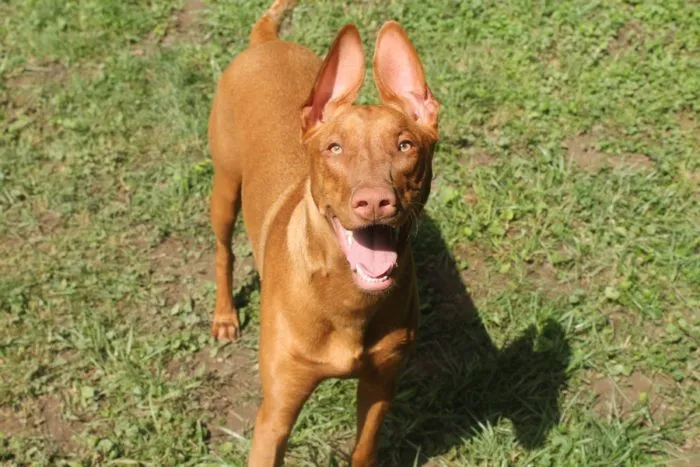 Pharaoh Hound dog with expressive ears
Pharaoh Hound dog with expressive ears
Personality: Intelligent, Quirky, and Sensitive
If you are considering Pharaoh Hound puppies for sale, prepare for a dog that is likely smarter than you are! These hounds are incredibly intelligent and clever, often surprising their owners with their problem-solving abilities. They are truly the Mensa members of the canine world.
Beyond their intellect, Pharaoh Hounds are also known for their playful and goofy nature. They can be quite the comedians, with exaggerated facial expressions and mannerisms that will constantly entertain you.
However, their intelligence comes with a caveat: Pharaoh Hounds are not typically “people-pleasers.” They operate on their own terms, often acting like little pharaohs themselves, expecting adoration rather than living to serve. They can be vocal, barking more than other sighthounds, and are highly sensitive to their environment and human emotions. Loud noises or harsh words can deeply upset them, causing them to withdraw.
Cuddle preferences also vary. While some Pharaoh Hounds can be incredibly affectionate and cuddly when the mood strikes (especially when tired), they may also politely evade your attempts at affection when they’re busy or simply not in the mood. They are very attached to their families, often showing separation anxiety when someone leaves, but might not always be demonstrative about it. They will, however, greet you with their famous “Pharaoh Hound smile” upon your return and then probably search your bags for treats!
Life with a Pharaoh Hound: What Prospective Owners Need to Know
Bringing a Pharaoh Hound puppy home is a commitment to a unique lifestyle. Their energy, training needs, grooming requirements, and health considerations are all important factors for potential owners.
Energy Levels: From Zoomies to Couch Potato
Pharaoh Hounds have two main speed settings: lightning-fast zoomies and deep sleep. There’s rarely an in-between. When they’re “on,” they are incredibly high-energy dogs that need ample space to run. Their running style is reminiscent of a Greyhound, so be mindful and stay out of their way to avoid accidental collisions. Due to their need for bursts of speed, they are not ideal for apartment living unless you can commit to daily visits to a secure, large dog park.
When out for walks, a standard flat collar isn’t usually sufficient due to their long, slender “giraffe-like” necks. A Martingale collar or a well-fitting harness is highly recommended to prevent them from slipping out.
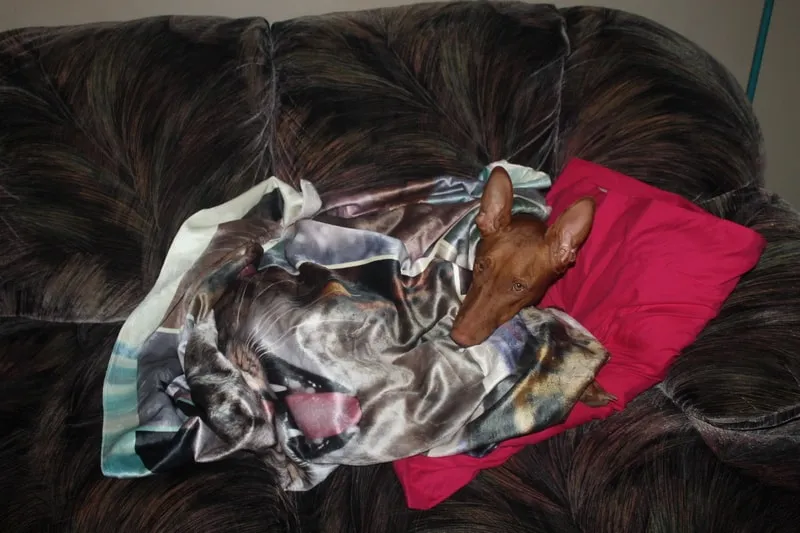 A Pharaoh Hound lounging comfortably on a blanket
A Pharaoh Hound lounging comfortably on a blanket
Training Your Intelligent Pharaoh Hound
Training a Pharaoh Hound requires patience, consistency, and a positive reinforcement approach. They are sensitive dogs and will shut down or become unresponsive if subjected to negative training methods, yelling, or scare tactics.
These dogs are driven by self-interest and quickly learn what’s in it for them. Food-motivated training works exceptionally well, allowing them to master commands and tricks. However, it’s crucial to understand their very high prey drive. When a Pharaoh Hound spots something they perceive as prey (like a squirrel, a rabbit, or even a bicycle!), all training can go out the window. This instinct is incredibly powerful and overrides commands, treats, and any other form of bribery. Therefore, they should always be kept on a leash or in a securely fenced area when outdoors.
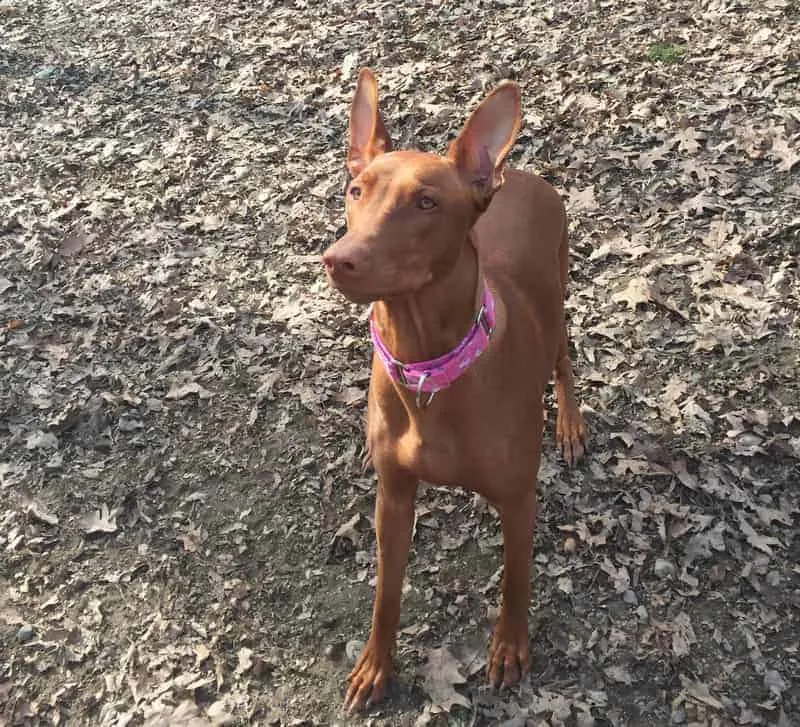 Pharaoh Hound wearing a Martingale collar
Pharaoh Hound wearing a Martingale collar
Grooming: Low Maintenance Coat, High Maintenance Nails
Grooming a Pharaoh Hound’s coat is relatively easy. Their short, fine coat sheds minimally, making them a fairly allergy-friendly breed, though not truly hypoallergenic. A quick brush once a week is usually sufficient to keep their coat healthy and shiny.
However, their nails are a different story. Pharaoh Hounds tend to have fast-growing, talon-like nails that require regular attention. Clipping them can be challenging as they often squirm, making it difficult to avoid cutting too far down into the quick. Many owners find a Dremel-style rotary tool much easier and safer for maintaining their nails.
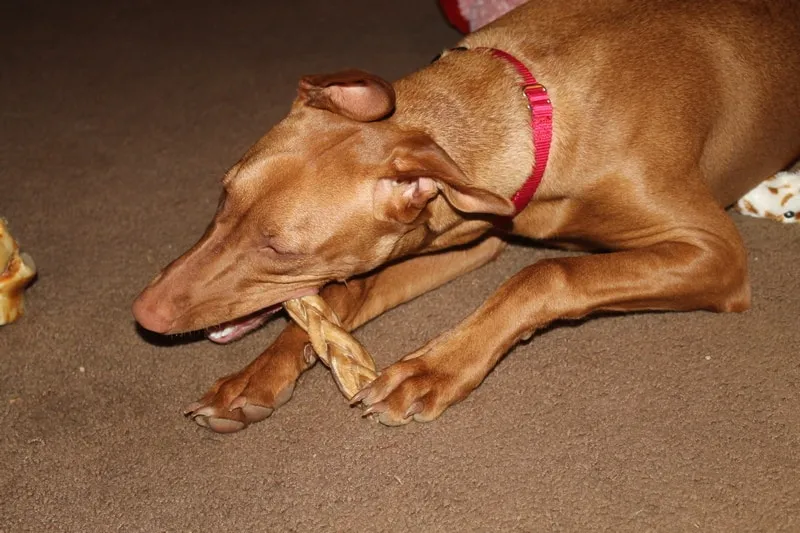 Close-up of a Pharaoh Hound's paw, showing long nails
Close-up of a Pharaoh Hound's paw, showing long nails
Health Considerations: A Naturally Robust But Sensitive Breed
Overall, Pharaoh Hounds are considered a very healthy breed, thanks to the diligence of reputable breeders who conduct extensive health and genetic screenings. They are not typically prone to many of the common diseases affecting large breeds.
However, there are two key physiological sensitivities to be aware of:
- Anesthesia: Pharaoh Hounds are more sensitive to anesthesia than most other breeds, similar to Greyhounds. It’s crucial to discuss this with your veterinarian if your dog requires surgery (including spaying or neutering). Many vets follow a “Greyhound Protocol,” using newer, safer anesthetic agents and specific post-operative warming protocols to ensure their safety.
- Medication Sensitivity: Due to their rapid metabolism, Pharaoh Hounds can also be more sensitive to various medications. Always consult your vet about appropriate dosages and potential side effects for your Pharaoh Hound.
Pharaoh Hounds in the Family: Compatibility with Kids, Cats, and Other Pets
When considering Pharaoh Hound puppies for sale, compatibility with your existing family members is a top priority.
- Kids: Generally, Pharaoh Hounds are excellent with children. Their high energy and playful nature often mirror that of kids. However, due to their occasional rambunctious “zoomies,” supervision is always recommended, especially with very young children, to prevent accidental bumps.
- Cats: This is where their high prey drive comes into play. It takes considerable effort and consistent training from a young age to teach a Pharaoh Hound not to chase cats. While they can learn to coexist and even form affectionate bonds, a constant watchful eye is needed, and they should never be left unsupervised with cats.
- Other Dogs: Pharaoh Hounds typically get along very well with other dogs, often thriving in multi-dog households. They enjoy meeting new canine companions and generally have a friendly disposition towards them.
- Strangers: Their reaction to strangers can be a bit varied. While many Pharaoh Hounds are friendly and outgoing when meeting new people in neutral settings, they can be shy or reserved when strangers visit their home. Early and consistent socialization is key to ensuring they are well-adjusted.
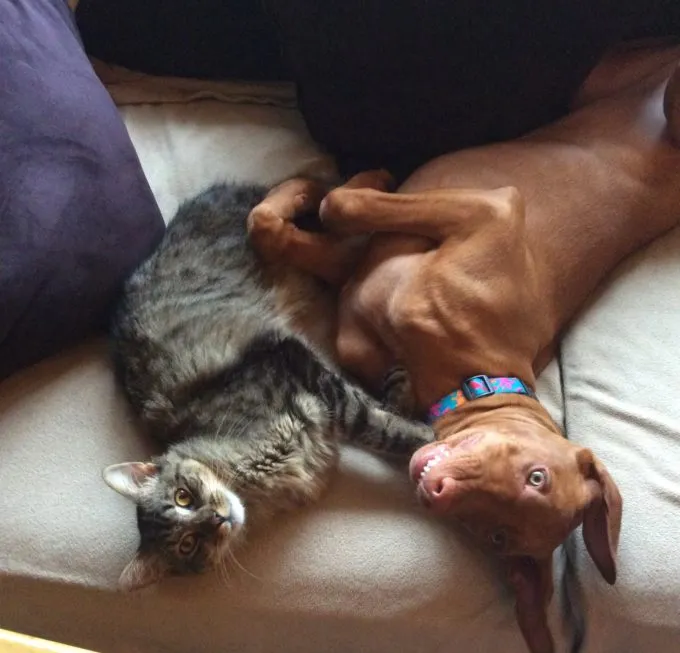 Pharaoh Hound resting with a child
Pharaoh Hound resting with a child
Beyond the Basics: Unique Pharaoh Hound Traits
Living with a Pharaoh Hound reveals several truly unique and endearing characteristics that set them apart.
- Pharaoh Hound Blushing: One of the most charming traits is their ability to blush! When excited or worked up, their ears, nose, and even cheeks can turn a noticeable reddish-pink. It’s an unmistakable sign of their heightened emotion.
- The Famous Pharaoh Hound Smile: While many dogs “smile,” a Pharaoh Hound’s grin is something truly special. Their entire face lights up, and their mouth pulls back in a wide, joyful expression, reaching all the way to those wonderful, expressive ears.
- Those Wonderful Ears! As mentioned, their large ears are not just beautiful; they are incredibly functional and communicative. They swivel and tilt, constantly scanning their surroundings, often providing a running commentary on their thoughts and feelings.
Finding Your Pharaoh Hound Puppy: Ethical Sourcing and What to Expect
Now that you have a comprehensive understanding of this magnificent breed, let’s address the crucial topic of finding Pharaoh Hound puppies for sale responsibly.
Why “Black Pharaoh Hound Puppies” Don’t Exist
Reiterating from earlier, if you are specifically looking for “black Pharaoh Hound puppies for sale,” it’s vital to adjust your expectations. The standard color for purebred Pharaoh Hounds is reddish-tan to reddish-brown, often with white markings. Any breeder claiming to offer black Pharaoh Hounds is either misrepresenting their dogs (potentially mixed breeds) or not adhering to established breed standards. Focusing on finding a healthy, well-socialized puppy from a reputable source, regardless of a non-standard color, is paramount.
Reputable Pharaoh Hound Breeders: Your Best Resource
Given their rarity, finding a Pharaoh Hound puppy is often challenging. Your first step should always be to check with a Pharaoh Hound rescue group. While few Pharaoh Hounds end up in shelters, breed-specific rescues can be a fantastic option.
For most prospective owners, finding a reputable breeder will be the primary route. It is absolutely crucial to do your homework. A good breeder will:
- Prioritize Health: Conduct extensive health and genetic screenings on their breeding dogs to ensure the puppies are free from inherited conditions. Ask for proof of these screenings.
- Adhere to Breed Standards: Breed for temperament and appearance that aligns with the AKC or equivalent breed club standards.
- Provide a Healthy Environment: Raise puppies in a clean, stimulating home environment, ensuring early socialization.
- Offer Support: Be a resource for you throughout your dog’s life, willing to answer questions and provide guidance.
- Screen Buyers: Be just as interested in you as you are in them, asking questions to ensure their puppies go to suitable homes.
- Be Transparent: Allow you to meet the puppy’s parents and see their living conditions.
The Cost of a Pharaoh Hound Puppy
Pharaoh Hounds are considered a rare breed, and their cost reflects this rarity, along with the extensive health testing and care provided by reputable breeders. The price for a purebred Pharaoh Hound puppy from a reputable breeder typically ranges from $1,500 to $2,500, though some may charge upwards of $5,000 depending on lineage, location, and breeder reputation. This investment ensures you are getting a puppy that has been carefully bred for health and temperament.
What to Ask a Breeder When Looking for Pharaoh Hound Puppies for Sale
When contacting a breeder, be prepared with a list of questions to ensure you’re making an informed decision:
- What health screenings do you perform on your breeding dogs, and can I see the results?
- What is the temperament of the puppy’s parents?
- What is your philosophy on puppy socialization?
- What is included in the purchase price (vaccinations, microchip, health guarantee)?
- What is your return policy or rehoming assistance if circumstances change?
- Can you provide references from previous puppy buyers?
- What is the expected size and activity level of the puppies?
- How do you ensure responsible placement of your puppies?
Choosing to welcome a Pharaoh Hound puppy into your life is a decision you won’t regret. Their unique personalities, intelligence, and affectionate nature (on their own terms!) make them truly exceptional companions. While they present certain quirks and challenges, the joy they bring is immeasurable.
Frequently Asked Questions About Pharaoh Hounds
Are Pharaoh Hounds good with kids?
Yes, generally, Pharaoh Hounds are very good with kids. They share a similar high energy and playful spirit. However, due to their rambunctious “zoomies,” always supervise playtime with small children to prevent accidental collisions.
Do Pharaoh Hounds shed?
Technically, yes, Pharaoh Hounds do shed. However, their very short coat means shedding is minimal and barely noticeable compared to many other breeds.
Are Pharaoh Hounds hypoallergenic?
No, Pharaoh Hounds are not considered hypoallergenic. While their minimal shedding can make them more tolerable for people with mild allergies, they still produce dander. If you have severe allergies, it’s best to spend time with the breed before committing.
Do Pharaoh Hounds bark a lot?
Yes, unlike many other sighthounds which are generally quiet, Pharaoh Hounds are known to be quite vocal and will bark at very little provocation.
Are Pharaoh Hounds good with cats?
Pharaoh Hounds have a very high prey drive, which can make them challenging companions for cats. While they can learn to coexist with cats if raised together from a young age with consistent training, they should never be left unsupervised.
Where did Pharaoh Hounds originate?
Pharaoh Hounds originated in Malta, not Egypt, despite their name and ancient imagery. They are the national dog of Malta, where they are known as “Kelb tal-Fenek.”
What does “Kelb tal-Fenek” mean?
“Kelb tal-Fenek” is the Maltese name for Pharaoh Hound and translates to “rabbit dog,” referencing their traditional use for hunting rabbits and other small game. This also underscores why they may not be suitable for homes with pet rabbits.
Is there such a thing as a “toy Pharaoh Hound” or “black Pharaoh Hound”?
No, there is no recognized purebred “toy Pharaoh Hound” or “black Pharaoh Hound.” Pharaoh Hounds are a medium-sized breed with a distinct reddish-tan to reddish-brown coat. Claims of “toy” or “black” Pharaoh Hounds likely refer to mixed breeds or are misleading. Reputable breeders protect the integrity and standards of this rare breed.
Conclusion
Bringing a Pharaoh Hound puppy into your life is an adventure filled with joy, laughter, and a healthy dose of intellectual challenge. They are sensitive, intelligent, and deeply devoted companions who, despite their “pharaoh-like” tendencies, will enrich your home immeasurably. While the search for Pharaoh Hound puppies for sale may require patience due to their rarity, focusing on reputable breeders and understanding the true characteristics of the breed (including their distinctive coloration, free from any “black” myths) will ensure you find a healthy, well-adjusted pup that will thrive in your care. Embrace the journey, prepare for a dog that truly marches to the beat of its own drum, and get ready for a lifetime of unique companionship.
References
- The American Kennel Club (AKC): https://www.akc.org/dog-breeds/pharaoh-hound/
- The Pharaoh Hound Club of America (PHCA): http://www.ph-club.org/ (for breed information and rescue resources)
- Greyhound Gang – Anesthesia Protocol: https://www.greyhoundgang.org/learn/health/anesthesia/ (General information on sighthound anesthesia sensitivity)
